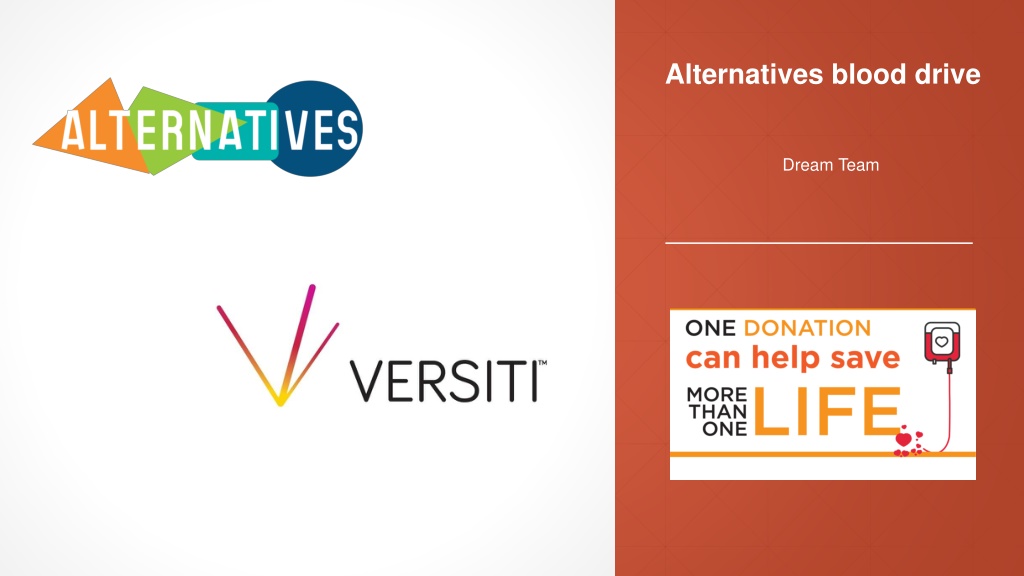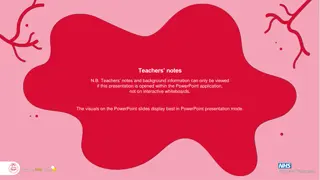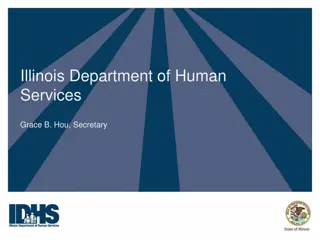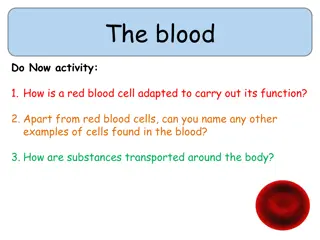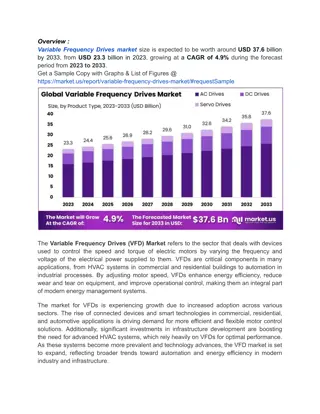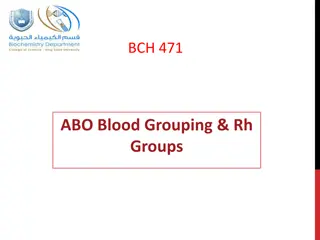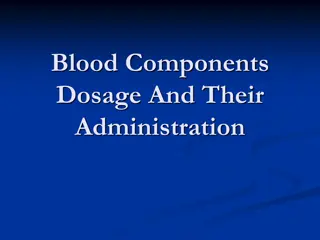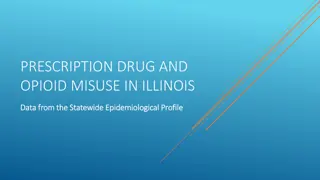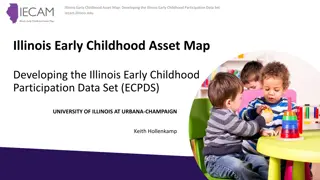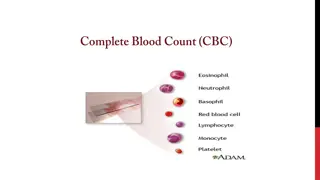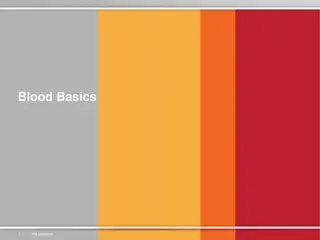Versiti Blood Center of Illinois: Community Impact through Blood Drives
Versiti Blood Center of Illinois, a nonprofit organization, plays a vital role in healthcare by organizing blood drives to ensure a sufficient supply of blood for hospitals in the Chicagoland and Northwest Indiana area. Through employee engagement, community outreach, and raising awareness about the importance of blood donation, Versiti aims to improve patient outcomes and strengthen public health initiatives. Hosting blood drives not only supports healthcare but also addresses disparities in healthcare access, particularly concerning Black and Brown youth affected by conditions like sickle cell disease.
Download Presentation

Please find below an Image/Link to download the presentation.
The content on the website is provided AS IS for your information and personal use only. It may not be sold, licensed, or shared on other websites without obtaining consent from the author. Download presentation by click this link. If you encounter any issues during the download, it is possible that the publisher has removed the file from their server.
E N D
Presentation Transcript
Alternatives blood drive Dream Team
WHO IS VERSITI? Versiti is a fusion of donors, scientific curiosity and precision medicine that recognizes the gifts of blood and life are precious. We are home to the world- renowned Versiti Blood Research Institute, we enable lifesaving gifts from our donors, and we provide the science behind the medicine through Versiti's diagnostic laboratories. Versiti is a 501(c)(3) nonprofit organization. We are on a mission of service to improve patient outcomes, to advance the field of personalized medicine, and to strengthen the health of communities everywhere. We make discoveries that contribute to better patient care. And we are a beacon of hope, care and innovation in the communities we call home.
Versiti Blood Center of Illinois Founded in 1943 Based in Aurora, Versiti Blood Center of Illinois serves 63 hospitals in a 12-county area in Chicagoland and Northwest Indiana, collecting more than 155,000 units of blood annually.
Objectives Contribute to the Community: By organizing a blood drive, we can provide a platform for employees to give back to the community in a way that directly impacts lives. Employee Engagement: The blood drive will encourage a sense of unity and camaraderie among our employees as they come together for a common cause. It will boost morale and team spirit. Education and Awareness: Blood drives provide opportunities for education about blood donation, its importance, and the medical processes involved. Nonprofits can use these events to raise awareness about specific health conditions that require blood transfusions and dispel myths and misconceptions about blood donation. Public Health: Blood drives contribute to public health initiatives by preventing blood shortages. When hospitals have access to an ample supply of blood, they can provide proper medical care without delays caused by shortages.
Why? It s F-R-E-E! Blood donation is a crucial aspect of healthcare, saving millions of lives every year. Unfortunately, blood shortages are a persistent concern for medical institutions, and our involvement can make a significant impact. As a leading organization known for our dedication to employee welfare and community engagement, hosting a blood drive is an opportunity to reinforce our values and actively participate in a lifesaving endeavor. Hosting a blood drive brings our entire staff together because there is an opportunity to rally around an important community cause.
Why? It impacts our youth! Blood shortages can have significant effects on Black and Brown youth, as these communities often face unique challenges and disparities in healthcare access. Here's how blood shortages can impact Black and Brown youth: Sickle Cell Disease: African Americans are disproportionately affected by sickle cell disease, a genetic blood disorder that causes red blood cells to become misshapen and break down, leading to anemia and other health complications. Regular blood transfusions are often necessary to manage the condition. Blood shortages can make it challenging to provide timely and sufficient transfusions for individuals with sickle cell disease, potentially worsening their health outcomes. 1. 2. Delayed Medical Care: Black and Brown youth might experience delays in receiving necessary medical care due to blood shortages. This can affect their ability to undergo surgeries, recover from injuries, and manage chronic conditions, ultimately impacting their overall health and well-being. 3. Disparities in Access: Historically, communities of color, including Black and Brown communities, have faced barriers to accessing quality healthcare. Blood shortages can exacerbate these disparities, leading to unequal access to life-saving treatments and interventions for youth in these communities.
Why? It impacts our youth! 1. Representation in Donor Pool: Ensuring diversity within the blood donor pool is essential for matching blood products with the needs of patients. Black and Brown individuals often have unique blood types that are more prevalent within their communities. Blood shortages can highlight the need for increased representation in the donor pool from these communities. 2. Health Awareness: Blood shortages can underscore the importance of health awareness and education within Black and Brown communities. Increased education about blood donation, health conditions, and the impact of blood shortages can empower youth to become advocates for their own health and that of their communities. 3. Advocacy for Equity: Blood shortages can spark conversations about healthcare disparities and systemic inequalities that affect Black and Brown communities. These discussions can lead to advocacy efforts aimed at improving healthcare access and equity for youth and their families.
Versitis requirement A minimum of 25 donors is needed to host a blood drive.
Statistics U.S. Blood Donation Statistics and Public Messaging Guide - America's Blood Centers (americasblood.org)
Statistics The blood type most often requested by hospitals is type O. About 45% of people in the U.S. have Group O (positive or negative) blood; the proportion is higher among Hispanics (57%) and African Americans (51%). U.S. Blood Donation Statistics and Public Messaging Guide - America's Blood Centers (americasblood.org) Facts About Blood Supply In The U.S. | Red Cross Blood Services
